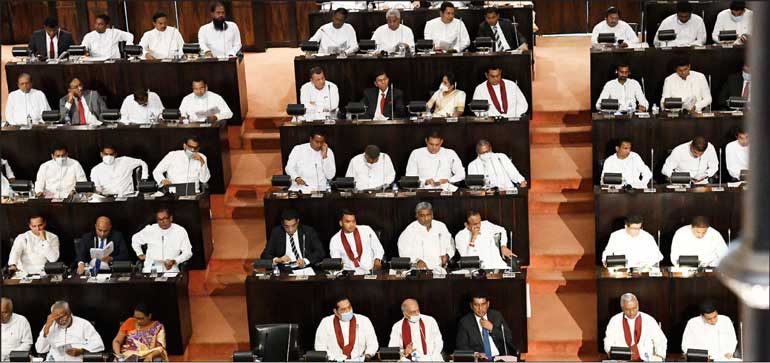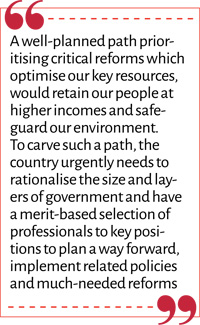Thursday Feb 19, 2026
Thursday Feb 19, 2026
Saturday, 21 August 2021 01:06 - - {{hitsCtrl.values.hits}}

Sri Lanka has a wealth of competent professionals of integrity and acumen who can move this country on a path to sustainable development. For this, the Executive and Legislature (President, Cabinet and Parliament), have to admit their abject failure and ask for help – Pic by Shehan Gunasekara
 Public discourse everywhere confirms that Sri Lanka is in a parlous situation on several fronts. This paper appraises our current situation against a proposed national development framework.
Public discourse everywhere confirms that Sri Lanka is in a parlous situation on several fronts. This paper appraises our current situation against a proposed national development framework.
National resources
Sri Lanka’s two key resources are its people and environment. People have had access to traditional, healthy nutrition and free preventive and curative health services, as well as two ancient languages (Sinhala, Tamil), a global language (English) and free education up to tertiary level.
Our unique environment provides the natural security of an island, a strategic geographic location and manageable size, with extraordinary biodiversity. It is mostly arable, mainly flat, with accessible mountains, plentiful water and easy road, air and sea access.
Since Independence, successive governments under-utilised these resources. First, they complacently followed the unsustainable colonial development path, without forward-looking reforms for us. More recently, they mimicked the development paths of Western industrialised countries and city states, Dubai and Singapore, inappropriate for Sri Lanka.
They prioritised infrastructure above people. While lip service was paid to their importance, teaching English, our language issues and labour market reforms were neglected. This trajectory failed to retain Sri Lanka’s human capital. Neglect of minority concerns, inadequate incomes and employment opportunities led to brains and skills drain, as many who benefitted from free health and education left Sri Lanka. We now face a critical human capital shortage.
Governments also failed to recognise our environment’s potential for sustainable food security and earnings from exports and tourism. Instead, we see degradation and contraction of rainforests (Sinharaja), detrimental landfills, garbage dumps and ad hoc construction in wetlands (Muthurajawela), invasive plant expansion in national parks and irrigation tanks (Minneriya, Uda Walawe), violation of building guidelines in historical sites and resort areas (Colombo, Sigiriya, Unawatuna), plastic and chemical pollution (island-wide) and urban air pollution (Colombo, Kandy). Wasteful, thoughtless construction (Mattala Airport, Hambantota International Conference Centre, Colombo evictions and destruction of historic buildings) focussed on means to well-being (GDP growth, FDI, export growth, physical infrastructure, etc.), not the goal.
Lack of a framework and priorities for our key resources has led to multiple crises Sri Lanka faces today:
nFiscal, foreign exchange and debt crisis – Against wasteful expenditure, inconsistent tax and trade policies have drastically reduced revenue and foreign earnings, leading to ballooning debt. We face financial, monetary and fiscal instability.
 National goals and framework
National goals and framework
Sri Lanka can overcome these crises. For this, governments need commitment to sustainable national goals and a framework prioritising people and environment.
Basic premise: Nations strive to improve the wellbeing of all citizens, which requires sustainable development and social justice.
Goal for people: To improve their wellbeing, which encompasses three dimensions – material, intellectual and emotional – with social justice. Material needs include physical health, food, clothing, shelter, utilities, transport and communication. Intellectual needs include education, skills development, employment opportunities and leisure activities. Emotional needs include mental health and a sense of personal security within the home and country to follow one’s religious beliefs, cultural traditions, sexual orientation, etc., without harm to others. Social justice ensures impartiality in access and opportunities for all citizens, regardless of any differentiating factor.
Goal for environment: To safeguard all biodiversity through sustainable development - lasting improvement in the well-being of current and future generations. Biodiversity includes rainforests, dry-zone forests, mountain plains, wetlands, beaches, dunes, reefs, lagoons, mangroves, rivers, waterfalls, reservoirs, tanks and air quality.
These goals are best understood as a government’s responsibility to provide to its citizens, through constant review and reforms, the following:
Current situation
Sri Lanka has a bloated public service and excessive layers of political representation. The public sector employs about 1.2 million people (15% of total work force) in 1,200 major institutions covering over 30,000 smaller units.
Sri Lanka’s population of 22 million, has a parliament of 225 members with about 30 Cabinet Ministers and 40 State Ministers at national level. In contrast, India’s population of 1,326 million (6 times) has a Lok Sabha of 545, 15 Cabinet ministers and 28 State ministers. Malaysia’s population of 33 million (1.5 times) has 222 members in its House of Representatives, 32 ministers and 38 deputy ministers.
At Local Government level, Sri Lanka has 8,708 elected representatives in 341 local authorities (24 Municipal Councils (MCs), 41 Urban Councils (UCs) and 276 Pradeshiya Sabhas (PS)). If Provincial Councils were in place, there would be about 500 Provincial Counsellors and another level of ministers. With no clear delegation of responsibilities among these layers and overlapping institutions, there is considerable confusion in policymaking and service delivery. For decades, instead of focussing on their substantive role of policymaking and implementation for longer term national objectives, Cabinet and other ministers have been micro-managing day-to-day activities, such as transfers, promotions, job and school placements, etc.
Overlap of functions has killed accountability. Senior bureaucrats, fearful for their jobs in a politicised culture, have forgotten their advisory role. Most muddle around at the bidding of their political masters or hoodwink them, in order to remain in favour. Those with integrity have paid the price for their commitment and professionalism, by removal.
With such a serious breakdown of independence, professionalism, accountability, channel-of-command and decision-making processes in key systems of authority and electoral representation, successive governments have failed to deliver universal rights. The cumulative outcome has Sri Lanka in an extremely unstable and precarious situation. There is neither time nor space for further bungling or foolish posturing that we see among those responsible for running the country today.
Way forward
A well-planned path prioritising critical reforms which optimise our key resources, would retain our people at higher incomes and safeguard our environment. To carve such a path, the country urgently needs to rationalise the size and layers of government and have a merit-based selection of professionals to key positions to plan a way forward, implement related policies and much-needed reforms. My wish list:
Conclusion
Sri Lanka has a wealth of competent professionals of integrity and acumen who can move this country on a path to sustainable development. For this, the Executive and Legislature (President, Cabinet and Parliament), have to admit their abject failure and ask for help. Till then, men and women of ability will remain in the wings until it is too late. Sadly, that day may not be far off.
(The writer is a former Assistant Governor and Director of Statistics of the Central Bank of Sri Lanka. She served on the Delimitation Commission of Sri Lanka from 2015 to 2020.)